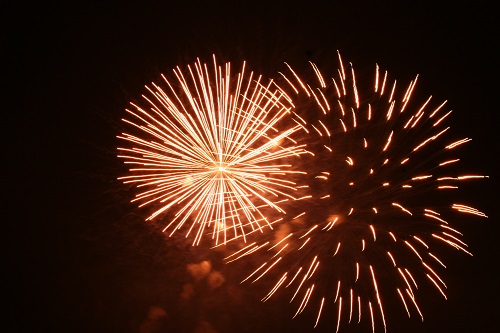The best way to stay safe is to leave fireworks to the professionals. But, if you must include them in your holiday celebrations, do so very carefully and take every precaution to protect your family and home.
Farm Bureau Insurance® claims adjusters have seen all too often damage and injuries caused by fireworks. Nationwide, each year, fireworks start on average 18,500 fires and cause $43 million in property damage. Be especially careful when cleaning up debris. Even if it looks like the debris is no longer burning, it is best to leave it until the next morning before sweeping up and placing the debris into a trash bin. Firework debris can reignite after being dumped into a trash bin. If that trash bin is left in the garage or next to your home, it can spark a fire.
 In addition to being a fire hazard, fireworks can cause significant injury. Children are particularly vulnerable to injury, especially when using sparklers. You would never hand a blow torch to a child, but sparklers can burn at temperatures in excess of 2,000 degrees Fahrenheit. Children’s arms are too short to hold sparklers a safe distance from their face and body, and clothing can easily catch on fire.
In addition to being a fire hazard, fireworks can cause significant injury. Children are particularly vulnerable to injury, especially when using sparklers. You would never hand a blow torch to a child, but sparklers can burn at temperatures in excess of 2,000 degrees Fahrenheit. Children’s arms are too short to hold sparklers a safe distance from their face and body, and clothing can easily catch on fire.
Despite all of the risks, if you plan to celebrate with fireworks, keep these safety tips in mind:
- Be extremely careful when discarding firework debris. Leave debris on the ground to completely burn out. Wait until morning if possible before sweeping up the debris and then saturate the debris with water. Once properly doused in water, place into a nonflammable trash bin outside and away from your home and car.
- Risk of injury is more than twice as high for children between 10 and 14. Never allow children to handle fireworks.
- Consider replacing sparklers with red, white and blue glow sticks, confetti poppers or bubbles for young children.
- Never hold lit fireworks in your hand, lean over fireworks, or point fireworks at anyone.
- Avoid purchasing fireworks packaged in brown paper which typically means they are intended for professional use and could pose a higher level of danger to consumers.
- Keep a bucket of water or garden hose nearby.
- Make sure fireworks are legal in your area before using.
You should also review your homeowner’s policy with your Farm Bureau Insurance agent. If fireworks damage another person’s property or injure anyone, you may be responsible for damages.